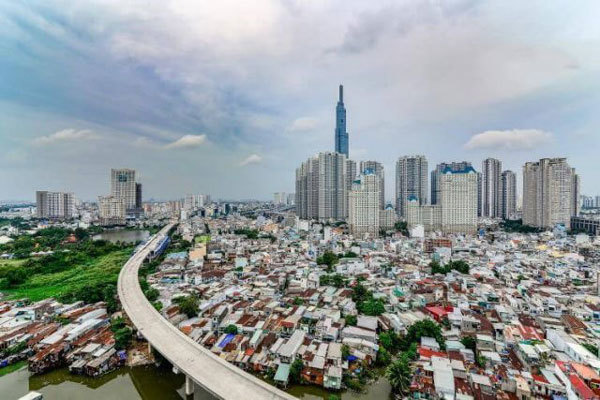Waiver of apartment maintenance fee in HCM City proposed
158 apartment buildings failed to transfer maintenance fees to management boards
 |
| A view of recently built apartment buildings in HCM City’s Binh Thanh District. VNS Photo Bo Xuan Hiep |
In a proposal about the management of apartment buildings’ maintenance funds, submitted recently to the Standing Committee of the National Assembly, HoREA said the fee should be paid only after a residents’ committee for the apartment building is selected.
The homebuyer’s fee would be paid within 60 months to the bank deposit account of the residents’ committee.
Currently, the fee, which is worth two per cent of the total apartment selling price without VAT, is paid to the project developer upon handover of the apartment, creating a financial burden for the buyer.
HoREA also recommended that the government have policy for supporting residents’ committees to collect the fee from the residents.
The problem is how to continue collecting additional maintenance fees after the initial maintenance fees are used up, as the 2014 Housing Law contains no regulations about this.
The association also proposed another option that is the state-run Public Service Company in city districts (where the apartment buildings are located) should collect and manage the maintenance fee under the supervision of the residents’ committees in the respective districts.
This option would entail complicated administrative procedures because of state-owned businesses' current operation and management policies. However, after the maintenance budget is used up, the State would continue being responsible for maintaining the apartment buildings through their entire lifespan.
According to HoREA, maintenance funds should only be used to repair and maintain common parts of the apartment buildings, including bearing structures such as frames, posts, floors and roofs, as well as load-bearing walls, corridors, stairways and emergency exit roads.
For other sections such as elevators, technical boxes, power supply systems, water supply, gas supply, communication systems and septic tanks, the monthly management fee must be used instead, it recommended.
In addition, the Government should seek ways to stop developers from delaying maintenance fee transfers, according to HoREA.
The Government was asked to provide guidance to localities so they would strictly comply with the provisions of Article 109 of the Housing Law.
Accordingly, after seven days from the date the residents’ committee is established, the developer of apartment buildings must transfer maintenance funds including the deposit interest rate to the residents’ committees for management under the law, HoREA proposed.
Developers must also notify the municipal or provincial housing management agency about the handover of funds. If there is no notification, residents’ committees would ask the municipal or provincial level People’s Committee (where the apartment building is located) to take appropriate action.
According to the current Housing Law, the owner of an apartment has to pay an extra two per cent of the total apartment selling price for maintenance inside the building. The fees collected by developers must be passed on to the residents’ committees no later than seven days after they are set up.
However, a number of developers have delayed transferring the fees to residents’ committees, causing disputes among residents and developers, according to the Ministry of Construction.
In a related issue, PM Nguyen Xuan Phuc recently asked the ministry and agencies to ensure sustainable development of the local property market.
The ministry has been asked to amend the Construction Law, the Housing Law and the Real Estate Business Law in the third quarter of the year.
VNS
 The HCM City Real Estate Association (HoREA) has asked the National Assembly to approve a proposal which would give buyers of apartments more time to pay maintenance fees.
The HCM City Real Estate Association (HoREA) has asked the National Assembly to approve a proposal which would give buyers of apartments more time to pay maintenance fees.